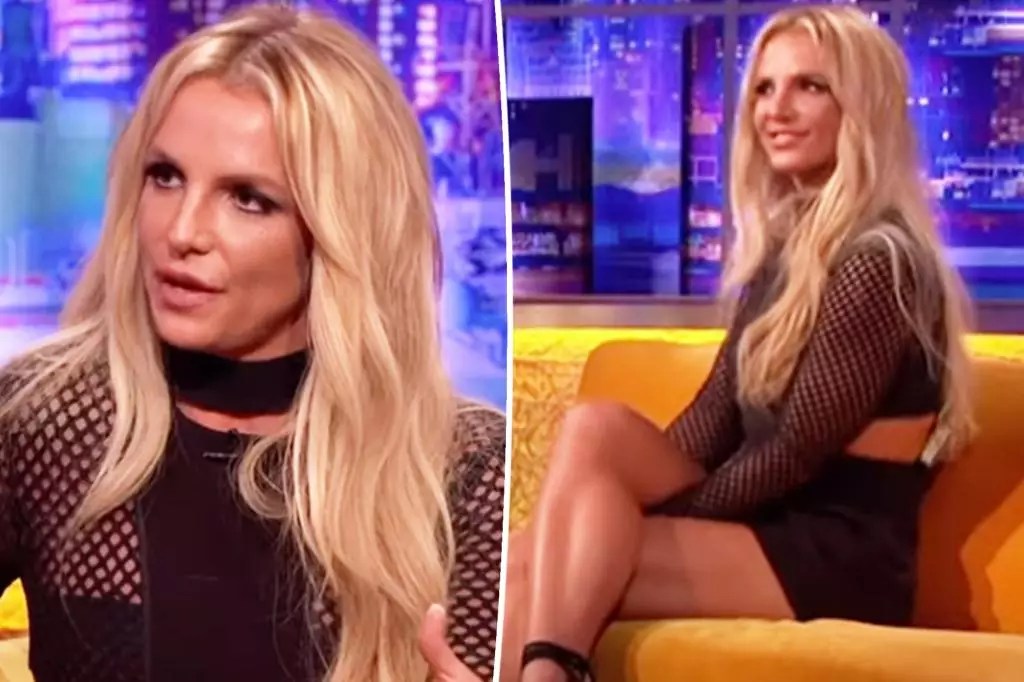In an intriguing twist of fate, a previously unseen clip featuring Britney Spears discussing her conservatorship has resurfaced, shedding light on her state during a notable segment from “The Jonathan Ross Show” in 2016. This interview, originally intended to promote her album “Glory,” found itself overshadowed by the restrictions imposed by Spears’ conservatorship, a legal framework that dictated much of her personal and professional life. The clip’s emergence eight years later serves as a poignant reminder of the challenges the pop icon faced, grappling not just with public perception but with an intricate web of control that stifled her creative expression.
The context is critical. In 2016, Spears was still recovering from the highly publicized breakdown that culminated in 2007. The years following her struggles involved a carefully constructed narrative, managed by a team that prioritized control over her image and output. During the segment, host Jonathan Ross prompted Britney about her increased musical involvement in her latest album, only for her to allude to a more significant issue at hand—the limitations imposed by the conservatorship. While her initial response was hesitant, it laid bare the truth many fans had suspected: the constraints of her legal situation were at odds with her artistic desires.
The editing of Spears’ comments on the conservatorship from the final airing of the show highlights the fraught relationship between celebrity storytelling and the corporate interests that often dictate it. Although Ross encouraged Spears to share her thoughts, her team had previously mandated silence surrounding the subject—a decision that undoubtedly restricted her freedom of speech. When she finally articulated her need for creative control, stating, “I want to make it my baby,” it was a rare, candid moment revealing her desire to break free from the confines placed upon her.
Fans and advocates have long questioned the validity of the conservatorship that Spears was under—an arrangement that lasted 13 years and was largely seen as abusive by those closest to her. The revelation of her comments from 2016 arrives as a stark reminder of the immense psychological toll such a situation can impose, particularly on someone known for her vibrant public persona. Despite her seemingly positive demeanor—when she smiled and answered affirmatively to Ross’s question about her happiness—there was an underlying complexity. The juxtaposition of her smile with the admission of feeling controlled signifies the depth of her struggles.
The airing of this footage has sparked conversations not just about Spears, but also the broader issues of conservatorships and the treatment of individuals within the public eye. In her 2023 memoir, “The Woman in Me,” Spears revisited the issue, noting how the critical conversation surrounding her conservatorship was intentionally omitted from public discourse. This exclusion speaks to a larger systemic problem regarding the rights of individuals under similar legal constraints, where their voices are often silenced.
It wasn’t until 2021 that Britney publicly condemned her conservatorship, labeling it abusive in a passionate testimony that reverberated throughout the media landscape. This moment served as a catalyst, leading to her father’s suspension as her conservator, eventually culminating in the termination of the conservatorship entirely. The progression from being silenced to reclaiming her narrative is empowering and underscores the importance of advocacy and the need for reform in systems that control individuals’ lives and decisions.
As Spears continues to navigate her path toward autonomy, the resurfacing of this interview reminds us of the significance of artistic liberation. The creative process is deeply personal, and for an artist like Britney Spears, who has contributed so much to pop music and culture, reclaiming agency over her work is paramount. The struggles she has faced can catalyze a broader movement for change, inspiring others caught in similar circumstances to stand up against unjust control.
Looking back on the events that have transpired since 2016, we are reminded of the resilience and strength that comes from confronting adversity. Spears’ journey, marked by both immense pressure and the fight for freedom, echoes the sentiments of many who have faced bureaucratic oppression. Recognizing these struggles not only validates her experiences but underscores a critical call for empathy and understanding in the context of celebrity and mental health discourse.
In the end, Britney Spears embodies the spirit of perseverance. Her story serves as a reminder that no one should be silenced, and that the path to reclaiming one’s voice is fraught with challenges—but ultimately, it leads to empowerment.







Leave a Reply